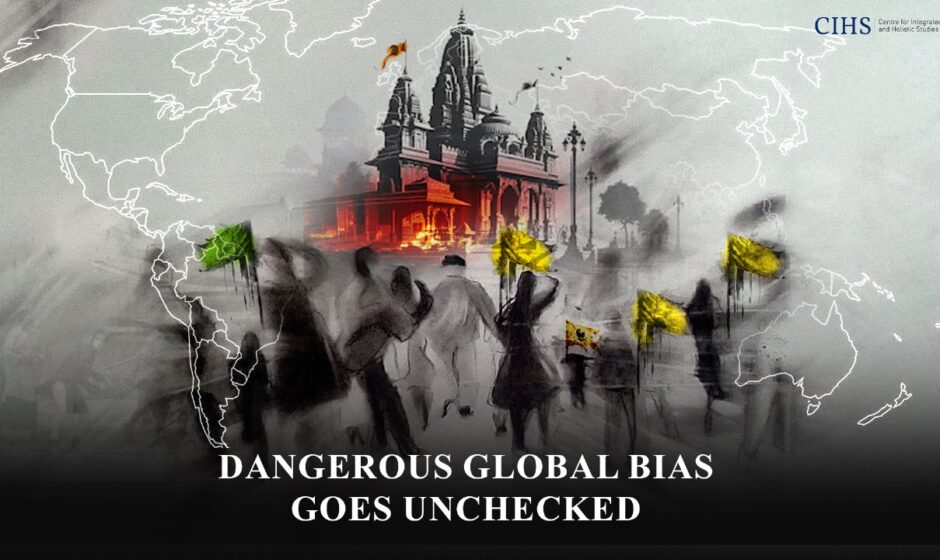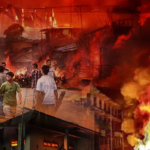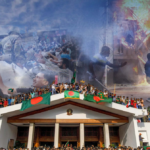Hindu Temples, places of worship, communities in Western democracies and Islamic nations face grave threat and metamorphosed into a huge crisis.
Dr Shailendra Kumar Pathak
There’s a pattern to it. Hate and violence against Hindu communities has gone global. From Hindu temples, individuals and organizations have experienced extreme violence, vandalism and intolerance.

These acts and incidents of violence have been reported in continuum with no respite to Hindus that seek to practice their faith in peace or live the Dharmic way propagating peace, tranquility and provide hope to humanity that’s under stress.
From Brampton and Mississauga in Canada to Bangladesh where scores of temples have either been vandalized or closed down ‘by force’, Hindu minorities have been at the receiving end.
Khalistani terrorists, jihadists to Christian evangelists have targeted temples and places of worship even in Bharat that’s home to over a billion Hindus.
Most disturbing is that these violent incidents that totaled to over 300 in last few months went largely unnoticed or unreported. Intolerance is something that’s common to most of the violent incidents.
For instance, on November 3 in Brampton, Canada, aggressive Khalistani terrorists attacked Hindu mandir in Brampton as practicing Hindus lined up for peaceful worship and Indian government representatives were busy verifying documents of elderly Sikhs and Hindus to ensure continuity in payment of pension back home. Devotees were beaten up, harassed, roughed up and pushed around violently while the Canadian police played dumb and deaf.
It’s not an isolated incident. Mississauga Hindu temple was also vandalized with anti-Hindu graffiti and intimidation of extreme variety.
On November 12, 2024, Vishwa Hindu Parishad (VHP) released a comprehensive report documenting a series of attacks on Hindu communities around the world underscoring the need for attention to what many see as an escalating crisis.
VHP report for 2024 documented hate crimes and attacks on temples in several nations like Canada, United States, United Kingdom, and Australia. Sharp rise in hate crimes targeting temples, cultural centers, and individuals has sent shock waves globally among 1.4 billion strong hindus spread across about 100 countries.
In Canada, multiple Hindu temples faced attacks over the year including desecration of Gauri Shankar Mandir in Brampton and BAPS Swaminarayan temple in Windsor, which were both defaced with anti-Hindu slurs.
United States temples in New Jersey, California and Texas vandalized and practicing Hindus harassed and defacement that included hateful messages specifically targeting Hindu beliefs and symbols were reported. This disturbing pattern suggests that these incidents are not random but part of a broader anti-Hindu agenda that is spreading in Western democracies.
In United Kingdom, similar wave of anti-Hindu violence has been reported. Just last year, Leicester, a city with large South Asian population, witnessed intense anti-Hindu violence. Hindu homes, businesses and temples were attacked as mobs chanted slogans against the community, forcing Hindu families to stay indoors in fear.
VHP’s report underscore that incidents like these signal an emboldened campaign against Hindu communities in societies that have long prided themselves on tolerance and inclusivity.
Australia, too, has not been immune to this wave of hostility. The VHP’s November 2024 report documents attacks on Hindu temples in Melbourne where Hindu symbols were defaced with graffiti linking Hinduism to unrelated political disputes.
This graffiti, filled with hateful rhetoric, was intended to shame and intimidate the Hindu community. Such acts reflect a deepening Hinduphobia that is no longer limited to casual prejudice but has manifested into violent, organized attacks on religious and cultural symbols. For Hindus living in these Western democracies, these incidents are betrayal of the promise of freedom and equality.
VHP’s comprehensive report also highlights a dire situation for Hindus in neighboring Islamic countries including Pakistan, Bangladesh and Afghanistan where the situation is far more severe. In Pakistan, targeting Hindus has reached what some activists call protracted genocide. Hindu temples are routinely desecrated or destroyed, often with little to no response from authorities.
Hindu girls, particularly in Sindh, face an alarming risk of abduction, forced conversion and marriage to much older Muslim men. VHP’s report included recent cases of Hindu girls being forcibly converted, torn from their families and left without any recourse for justice. Such violence and intimidation have become daily reality for Hindus in Pakistan where systemic discrimination allows these crimes to go largely unchecked.
In Bangladesh, Hindus are staring at total erasure. VHP report notes that in early August 2024 in a span of five hours more than 50 attacks were recorded on Hindu homes, temples and businesses across various districts in Bangladesh.
In places like Feni and Dinajpur, Hindu temples were desecrated and homes looted. Reports indicate that mobs of hundreds gathered to burn Hindu homes and assault community leaders as witnessed in multiple Bangladeshi districts such as Khulna, Satkhira and Bogura. This wave of violence has drawn international attention, as videos of the attacks went viral on social media showing mobs surrounding Hindu households, desecrating temples and forcing residents to flee their homes.
VHP’s extensive list of incidents in its November 2024 report illustrates alarming scale and frequency of these attacks. It emphasizes that this violence against Hindus often has ideological backing, particularly from radical Islamic factions or Khalistani extremists which justify hostility toward Hindus under religious pretexts.
VHP draws attention to anti-Hindu sentiment driven by certain missionary groups which promote aggressive conversion agendas in South Asia. This dynamic, the VHP argues, reveals that anti-Hindu prejudice is not only pervasive but systemic, fueled by a mix of religious and cultural biases.
Equally concerning is general lack of accountability or response. When Hindu temples are attacked in Canada or Australia, political leaders and media outlets often remain mute spectators contrasting sharply with the swift response seen for crimes against other communities. This discrepancy has led many within the Hindu diaspora to question double standard practiced in international houses in reporting hate crimes. VHP has noted that Hinduphobia remains underreported and misunderstood, even as acts of Hindumisia (hatred for Hindu beliefs and practices) rise steadily. Unlike Islamophobia or anti-Semitism which are widely and instantaneously recognized and condemned, Hinduphobia is overlooked and underestimated prejudice.
VHP’s latest report poses a serious question that haunts the global Hindu community: Are these incidents isolated cases of hate or part of a broader, coordinated pattern of anti-Hindu violence? The consistent targeting of Hindu places of worship, harassment of Hindu communities and relentless assault on Hindu culture and identity suggest a troubling trend that goes beyond sporadic incidents.
The VHP calls on international organizations and human rights watchdogs to address this growing anti-Hindu sentiment and protect vulnerable Hindu communities especially in countries where Hindus are a religious minority and often lack institutional support.
As attacks against Hindus continue to surge in both Western democracies and Islamic nations by Khalistani extremists and jihadists, it is time for the world to confront an uncomfortable possibility: that Hinduphobia is not only real but is escalating into a global threat.
The VHP’s November report serves as a powerful reminder that without timely intervention, this pattern of violence and hate could deepen, leaving millions of Hindus around the world feeling marginalized, vulnerable, and unprotected.
The question remains—will the international community take a firm stand against this rising tide of Hinduphobia or will it allow these prejudices to fester and grow, risking the safety and dignity of Hindu communities worldwide?
VHP’s findings demand a response and with each passing day, the cost of ignoring this reality is also heavier. The world must decide if it will defend the rights of Hindus to live without fear or allow a dangerous global bias to flourish unchecked.
(The author is a Delhi based Researcher and formerly an Assistant Professor of Political Science)



